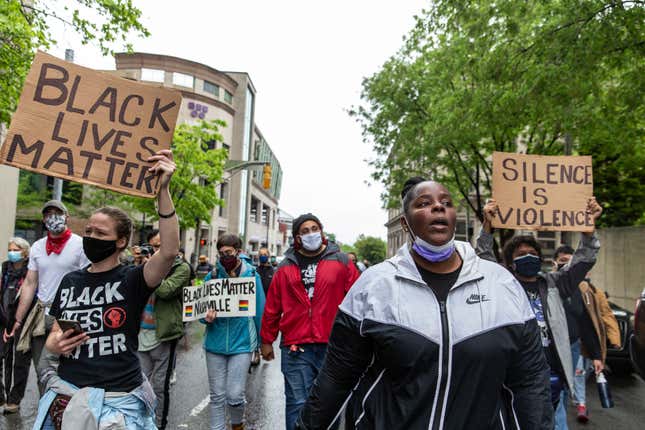
Could a BLM T-shirt threaten the conviction of George Floyd’s killer?
Over the past few days, a photo of Derek Chauvin juror Brandon Mitchell standing next to two relatives while wearing a black T-shirt with a picture of Martin Luther King Jr. with the words “Get your knee off our necks,” as well as a black baseball cap with the letters “BLM,” has been going around the web.
It is a pretty harmless T-shirt, yes? Why is it so hard to see that any Black person might wear a shirt that simply asks not to be killed? Well, in this America, it can bring your impartiality into question if you are deciding the fate of a cop who killed a Black man.
According to the Washington Post, the issue began with the jury selection, where candidates were required to fill out a 14-page questionnaire asking about a wide range of topics such as race, policing, education levels, professional experience, and hobbies to better understand the candidates.
The questionnaire also asked prospective jurors about Floyd, their opinions on the Black Lives Matter movement, and if they had attended protests or demonstrations against police brutality.
Mitchell said he responded “no” to a question asking if he, or anyone close to him, had ever participated in protests over police brutality.
While a lot of pro-cop folks are celebrating on social media, a jury consultant says the photo isn’t enough to reverse Chauvin’s verdict, according to the Post:
Jury consultant Alan Tuerkheimer said it is likely that Chauvin’s defense attorney Eric J. Nelson will use this information to push for an appeal but argued that the photo itself would not be enough to dismiss the conviction.
Tuerkheimer added, however, that Mitchell’s alleged denial that he was involved in any protests could prompt Judge Peter A. Cahill to bring Mitchell in for further questioning to assess whether he was untruthful, or worse, if he had an agenda or a predetermined verdict in mind.
Another expert had this to add:
Civil rights attorney Brian Dunn argued that while the photo is “undeniably suggestive of a possible bias in this juror,” the critical inquiry will be to determine whether the juror “lied about, or failed to provide complete answers on whether he has engaged in public activism, or whether he has any affiliations with BLM that go beyond the mere wearing of the shirt.”
Dunn said this will involve a careful review of this juror’s questionnaire, as well as the statements made in open court.
“If it is determined that the juror did not provide full disclosure to the defense, the question then becomes whether this lack of candor violated Mr. Chauvin’s right to a fair trial,” Dunn said, adding that this would require a much more detailed inquiry, typically addressed by an extensive evidentiary hearing.
I mean, if Mitchell could be seen as having bias for wearing a BLM T-shirt at an MLK event in Washington, D.C., that is most Black people. Very few of us would be able to serve on juries. You’d have to be a Black person who is apolitical, which, in America, is not really possible.
It would be like asking someone not to advocate for their own safety and welfare.
This does not appear to be too serious—yet. But if this does lead to a potential reversal of the verdict, it will set a horrible precedent for any Black person who wants to serve on a jury against a cop accused of killing Black people.

